- Clone
- G025H7 (See other available formats)
- Regulatory Status
- RUO
- Other Names
- CXCR3, G protein-coupled receptor 9 (GPR9), CKR-L2
- Isotype
- Mouse IgG1, κ
- Ave. Rating
- Submit a Review
- Product Citations
- publications
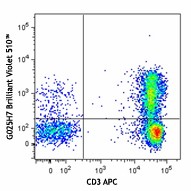
-

Human peripheral blood lymphocytes were stained with CD3 APC and CXCR3 (clone G025H7) Brilliant Violet 510™ (top) or mouse IgG1, κ Brilliant Violet 510™ isotype control (bottom). -

| Cat # | Size | Price | Quantity Check Availability | Save | ||
|---|---|---|---|---|---|---|
| 353725 | 25 tests | 164€ | ||||
| 353726 | 100 tests | 326€ | ||||
Human CXCR3, also known as GPR9, is a chemokine receptor that binds CXCL9, CXCL10, and CXCL11. It is a 38 kD seven-pass transmembrane receptor coupled to G-protein. CXCR3 is highly expressed by T cells (Th1), natural killer cells (NK cells), dendritic cells, mast cells, alveolar macrophages, eosinophils, and human airway epithelial cells. CXCR3 is important for effector lymphocyte recruitment into inflamed tissue in various inflammatory and autoimmune diseases, such as chronically inflamed liver, Crohn's disease, rheumatoid arthritis, multiple sclerosis, and inflammatory skin diseases.
Product DetailsProduct Details
- Verified Reactivity
- Human, Cynomolgus, Rhesus
- Reported Reactivity
- African Green, Baboon
- Antibody Type
- Monoclonal
- Host Species
- Mouse
- Immunogen
- Human CXCR3 transfectants
- Formulation
- Phosphate-buffered solution, pH 7.2, containing 0.09% sodium azide and BSA (origin USA).
- Preparation
- The antibody was purified by affinity chromatography and conjugated with Brilliant Violet 510™ under optimal conditions.
- Concentration
- Lot-specific (to obtain lot-specific concentration and expiration, please enter the lot number in our Certificate of Analysis online tool.)
- Storage & Handling
- The antibody solution should be stored undiluted between 2°C and 8°C, and protected from prolonged exposure to light. Do not freeze.
- Application
-
FC - Quality tested
- Recommended Usage
-
Each lot of this antibody is quality control tested by immunofluorescent staining with flow cytometric analysis. For flow cytometric staining, the suggested use of this reagent is 5 µl per million cells in 100 µl staining volume or 5 µl per 100 µl of whole blood.
Brilliant Violet 510™ excites at 405 nm and emits at 510 nm. The bandpass filter 510/50 nm is recommended for detection, although filter optimization may be required depending on other fluorophores used. Be sure to verify that your cytometer configuration and software setup are appropriate for detecting this channel. Refer to your instrument manual or manufacturer for support. Brilliant Violet 510™ is a trademark of Sirigen Group Ltd.
Learn more about Brilliant Violet™.
This product is subject to proprietary rights of Sirigen Inc. and is made and sold under license from Sirigen Inc. The purchase of this product conveys to the buyer a non-transferable right to use the purchased product for research purposes only. This product may not be resold or incorporated in any manner into another product for resale. Any use for therapeutics or diagnostics is strictly prohibited. This product is covered by U.S. Patent(s), pending patent applications and foreign equivalents. - Excitation Laser
-
Violet Laser (405 nm)
- Product Citations
-
- RRID
-
AB_2562066 (BioLegend Cat. No. 353725)
AB_2563642 (BioLegend Cat. No. 353726)
Antigen Details
- Structure
- CXC-chemokine receptor, G protein-coupled receptor, seven-pass transmembrane receptor
- Distribution
-
T cell subset, NK cells, plasmacytoid dendritic cells, GM-CSF activated CD34+ hematopoietic progenitors, mast cells, alveolar macrophages, eosinophils, and airway epithelial cells
- Function
- Essential in T cell recruitment to sites of inflammation
- Ligand/Receptor
- CXCL9, CXCL10, and CXCL11
- Cell Type
- Dendritic cells, Eosinophils, Epithelial cells, Hematopoietic stem and progenitors, Macrophages, Mast cells, NK cells, T cells, Tregs
- Biology Area
- Cell Biology, Immunology, Neuroinflammation, Neuroscience
- Molecular Family
- CD Molecules, Cytokine/Chemokine Receptors, GPCR
- Antigen References
-
1. Loetscher M, et al. 1996. J. Exp. Med. 184:963.
2. Cole KE, et al. 1998. J. Exp. Med. 187:2009.
3. Aksoy MO, et al. 2006. Am. J. Physiol. Lung Cell Mol. Physiol. 290:L909.
4. Curbishley SM, et al. 2005. Am. J. Pathol. 167:887.
5. Turner JE, et al. 2007. Mini. Rev. Med. Chem. 7:1089.
6. Wenzel J, et al. 2008. J. Invest. Dermatol. 128:67. - Gene ID
- 2833 View all products for this Gene ID
- UniProt
- View information about CD183 on UniProt.org
Related FAQs
- Does staining at room temperature or even at 37°C help for checking chemokine receptors expression?
-
Due to continuous recycling of many chemokine receptors, it may be worthwhile to consider staining at room temperature or at 37°C if the staining at lower temperature (which can potentially reduce receptor turnover) is not optimal.
Other Formats
View All CD183 Reagents Request Custom ConjugationCustomers Also Purchased
Compare Data Across All Formats
This data display is provided for general comparisons between formats.
Your actual data may vary due to variations in samples, target cells, instruments and their settings, staining conditions, and other factors.
If you need assistance with selecting the best format contact our expert technical support team.
-
Purified anti-human CD183 (CXCR3)
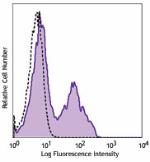
Human peripheral lymphocytes were stained with purified anti... -
APC/Cyanine7 anti-human CD183 (CXCR3)

Human peripheral blood lymphocytes were stained with CD3 FIT... -
FITC anti-human CD183 (CXCR3)
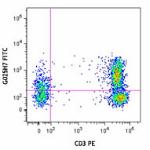
Human peripheral lymphocytes were stained with CD3 PE and CX... 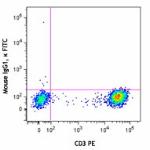
-
PE anti-human CD183 (CXCR3)
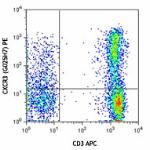
Human peripheral blood lymphocytes were stained with CD3 APC... 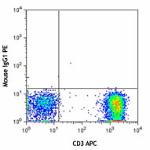
-
APC anti-human CD183 (CXCR3)
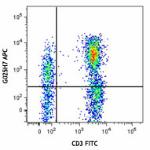
Human peripheral lymphocytes were stained with CD3 FITC and ... 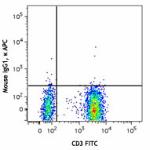
-
Alexa Fluor® 488 anti-human CD183 (CXCR3)
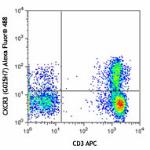
Human peripheral blood lymphocytes were stained with CD3 APC... 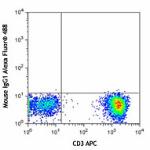
-
Alexa Fluor® 647 anti-human CD183 (CXCR3)
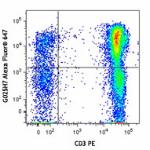
Human peripheral blood lymphocytes were stained with CD3 PE ... 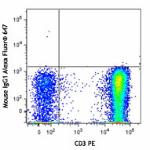
-
PerCP/Cyanine5.5 anti-human CD183 (CXCR3)

Human peripheral lymphocytes were stained with CD3 APC and C... -
Brilliant Violet 421™ anti-human CD183 (CXCR3)
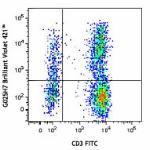
Human peripheral blood lymphocytes were stained with CD3 FIT... 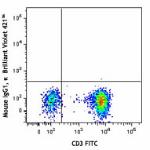
-
PE/Cyanine7 anti-human CD183 (CXCR3)

Human peripheral lymphocytes were stained with CD3 FITC and ... -
Pacific Blue™ anti-human CD183 (CXCR3)
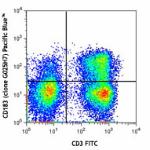
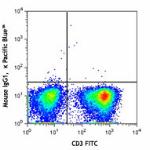
-
Brilliant Violet 510™ anti-human CD183 (CXCR3)
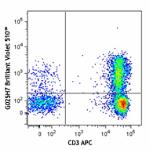
Human peripheral blood lymphocytes were stained with CD3 APC... 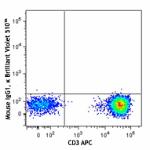
-
Brilliant Violet 605™ anti-human CD183 (CXCR3)
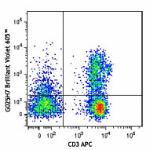
Human peripheral blood lymphocytes were stained with CD3 APC... 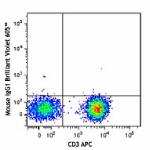
-
Brilliant Violet 650™ anti-human CD183 (CXCR3)
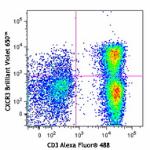
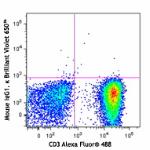
-
Brilliant Violet 711™ anti-human CD183 (CXCR3)
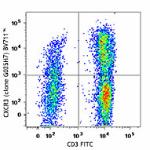
Human peripheral blood lymphocytes were stained with CD3 FIT... 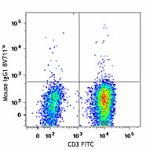
-
Purified anti-human CD183 (CXCR3) (Maxpar® Ready)
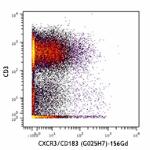
Human PBMCs stained with 170Er-anti-CD3 (UCHT1) and 156Gd-an... -
PE/Dazzle™ 594 anti-human CD183 (CXCR3)
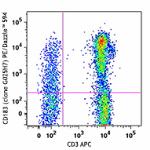
Human peripheral blood lymphocytes were stained with CD3 APC... 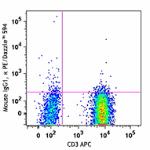
-
PerCP anti-human CD183 (CXCR3)
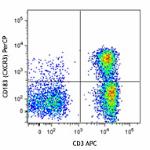
Human peripheral blood lymphocytes were stained with CD3 APC... 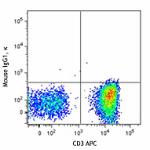
-
Brilliant Violet 785™ anti-human CD183 (CXCR3)

Human peripheral blood lymphocytes were stained with CD3 Per... -
Alexa Fluor® 700 anti-human CD183 (CXCR3)
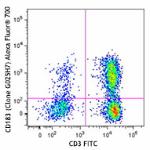
Human peripheral blood lymphocytes were stained with CD3 FIT... 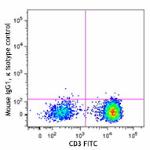
-
Biotin anti-human CD183 (CXCR3)
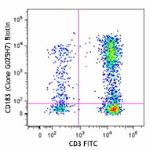
Human peripheral blood lymphocytes were stained with CD3 FIT... 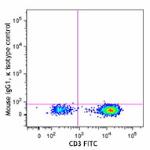
-
TotalSeq™-A0140 anti-human CD183 (CXCR3)
-
TotalSeq™-C0140 anti-human CD183 (CXCR3)
-
Ultra-LEAF™ Purified anti-human CD183 (CXCR3)

Anti-human CXCR3 (G025H7) blocks the chemotaxis of Baf3-hCXC... 
Human peripheral lymphocytes were stained with purified anti... -
TotalSeq™-B0140 anti-human CD183 (CXCR3)
-
APC/Fire™ 750 anti-human CD183 (CXCR3)

Human peripheral blood lymphocytes were stained with anti-hu... -
TotalSeq™-D0140 anti-human CD183 (CXCR3)
-
PE/Fire™ 810 anti-human CD183 (CXCR3) Antibody

Human peripheral blood lymphocytes were stained with anti-hu... -
APC/Fire™ 810 anti-human CD183 (CXCR3) Antibody

Human peripheral blood lymphocytes were stained with anti-hu... -
PE/Cyanine5 anti-human CD183 (CXCR3) Antibody

Human peripheral blood lymphocytes were stained with CD3 FIT... -
PE/Fire™ 640 anti-human CD183 (CXCR3)

Human peripheral lymphocytes were stained with anti-human C... -
PerCP/Fire™ 780 anti-human CD183 (CXCR3)

Human peripheral blood lymphocytes were stained with anti-hu... -
Spark Red™ 718 anti-human CD183 (CXCR3) (Flexi-Fluor™)
-
PE/Fire™ 700 anti-human CD183 (CXCR3)

Human peripheral blood lymphocytes were stained with anti-hu... -
PerCP/Fire™ 806 anti-human CD183 (CXCR3)

Human peripheral blood lymphocytes were stained with anti-hu... -
PE anti-human CD183

Typical results from human peripheral blood lymphocytes stai...
 Login / Register
Login / Register 











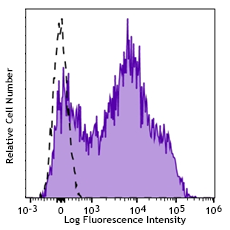
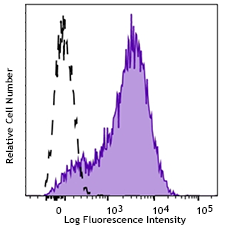
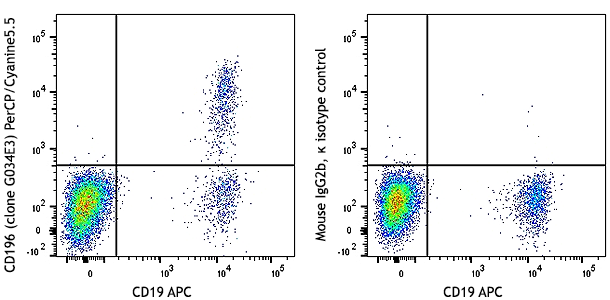
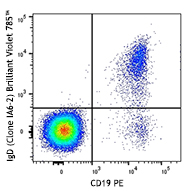



Follow Us